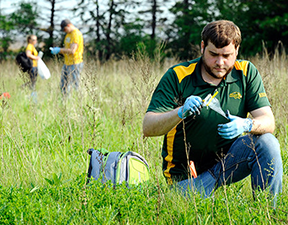 A prestigious National Science Foundation CAREER award will help an NDSU scientist and several students research the adaptation of bacteria.
A prestigious National Science Foundation CAREER award will help an NDSU scientist and several students research the adaptation of bacteria.
Peter Bergholz recently received a five-year award of up to $810,513 to study how bacteria survive, thrive and adapt when added to a different soil environment. Bergholz said the power to predict how bacteria evolve could help us develop new biotechnology or fight against the emergence of new infectious diseases.
More than eight undergraduate and graduate students, as well as a postdoctoral scholar, also will gain valuable experience by helping with the research.
The CAREER program recognizes junior faculty for outstanding research, excellent teaching and their ability to combine education and research to further the mission of their university.
Bergholz studies how populations of bacteria adapt to change when carried by larger organisms, wind or water to a different environment. The awarded project will look at bacteria at the genomic level.
“Genome sequences could tell us about every capability that an organism has, but the science is too young for that predictive power,” said Bergholz, assistant professor in the Department of Veterinary and Microbiological Sciences. “To make these kind of predictions, we have to know how genome characteristics relate to traits like survival in harsh conditions or disease-causing behaviors.”
A research team has conducted soil sampling at more than 130 sites along the Buffalo River in northwestern Minnesota. The work will continue until November.
Bergholz also will be developing a curriculum that can be used to teach biology and microbiology classes across the United States. The project will include developing computer software that realistically simulates how bacteria evolve in natural environments such as agricultural landscapes. An online workshop in microbial genomics will be developed for high school and community college students in cooperation with Tribal Colleges in North Dakota.
“Our research combines laboratory and field studies to gain greater insight about the development of biodiversity in bacterial populations struggling to survive in nature,” Bergholz said. infectious diseases.”
Bergholz received his doctorate in microbiology and molecular genetics from Michigan State University, East Lansing, Michigan. He served as a research associate in food science and in crop and soil sciences at Cornell University, Ithaca, New York.
Bergholz’s research is funded by Award No. 1453397 from the National Science Foundation.
As a student-focused, land-grant, research university, we serve our citizens.


